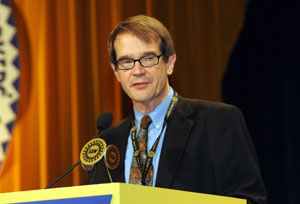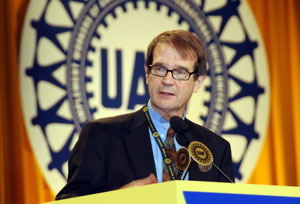Thursday |
||||||
Click Here For Thursday's Photo Gallery Remarks by Secretary of Labor Hilda Solis
|
Remarks by UAW President Bob King to the 35th International UAW Constitutional Convention “This convention is an example of the great Ron Gettelfinger,” King said. “We would not have what we have without the great Ron Gettelfinger.” Now that the torch has been passed as Gettelfinger’s two terms as UAW president ends, King says the theme for the UAW is mobilization. King acknowledged the steady string of organizing victories the UAW has had in various industries, pointing out the newly organized workers in higher education, the representation elections by casino dealers in Atlantic City, a recent contract victory by Boeing workers. “In an area close to my heart when I was regional director, no group was more enthusiastic than IPS (Independents, Parts and Suppliers) workers,” said King. “It touched me because they had so much less. I want to express on behalf of this team that we are going to come up with new and innovative strategies, and we’re going to call on the membership like we never have before,” he said. “We are understanding more than ever before,” he continued, “that we are one union, that we are one society, and if we don’t stand up and fight for our own membership in every sector and for all workers of the world, and for fair wages and benefits, they’re going to try to run away from our organized shops and our great contracts,” said King. “We’re not going to accept anyone telling us that any dream is impossible,” he said. “We are going to be dreamers, optimists, idealists. We are going to be the sowers of the seeds of economic justice in America.” King emphasized the power of tested bargaining strategies to invigorate the UAW’s strengths. “The way our union became the best in the world with top wages, benefits and pensions, was not only pattern bargaining in auto and aerospace, but with cross-industry, pattern bargaining. That was our power. We will get that back with comprehensive strategies,” he said. He also stressed the importance of organizing new workers without facing terrorism from workplace bosses, adding: “When our workers aren’t organized, they pit us against nonunion workers.” King looked back to successful strategies former UAW President Walter P. Reuther used in the 1930s and ‘40s, “We want to be in the forefront of fighting for social and economic justice in America,” said King. “I’m sick and tired of bosses getting millions of dollars and workers getting the short end of the stick.” King also warned members not to fall into the traps union-busting employers have tried since Reuther’s organizing days, such as pitting different races and ethnicities against each other to break worker solidarity. He said that the philosophy behind those tactics have reared their ugly heads again in our time with the new anti-immigrant law in Arizona. He urged UAW members to remember that we, like Reuther did in supporting minorities in the workplace many years ago, should do what’s right for social justice, not what’s popular. “We will fight for the right to organize because it is the right moral, spiritual fight to have,” King said. King ended his speech with a question that drew cheers and a standing ovation. “Sisters and brothers, are we ready to take on the fight for social and economic justice for all workers?” |
|||||
All content is copyrighted© UAW Region 8. Reuse is forbidden without written consent of UAW Region 8. |
||||||

 including organizing the unorganized using not only paid organizers, but also current UAW members; fighting for legislation that supports unionization rights but not waiting for federal legislation to begin that fight; and believing in economic and social justice for all.
including organizing the unorganized using not only paid organizers, but also current UAW members; fighting for legislation that supports unionization rights but not waiting for federal legislation to begin that fight; and believing in economic and social justice for all.